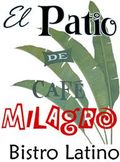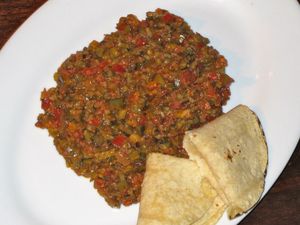 Chef Rafa Mora Sanchez takes the adage “Waste Not, Want Not” seriously. And diners at Café Milagro, on the road from Quepos to Manual Antonio National Park in Costa Rica, are glad that he does.
Chef Rafa Mora Sanchez takes the adage “Waste Not, Want Not” seriously. And diners at Café Milagro, on the road from Quepos to Manual Antonio National Park in Costa Rica, are glad that he does.
On a recent night at the Café, the chef served his own colorful version of picadillo, the Latin-American hash that usually consists of seasoned ground meat, diced vegetables, olives or raisins. His starts with the peels from unripe green bananas called plantains.
“We grew up very, very poor, near San Isidro de El General,” Rafa explained in Spanish, with my sister-in-law, Ceci, translating . “My grandmother was cooking for a very large family and to make enough picadillo for everyone she had to use the peels of platanos.”
At Café Milagro, Rafa neatly dices the plaintain peels and adds finely diced squash, red onion, sweet peppers, a bit of soft crumbled chorizo, cumin and garlic. Grated coconut adds a hint of sweetness, cilantro lends an herbal note. It’s well seasoned, but not spicy.
 When we were there, he served the unusual picadillo with a terrific piece of seared yellowfin tuna (local and fresh at this time of year) and paper-thin corn tortillas for scooping. But I loved the way the firm, perfectly diced pieces of fruits and veggies felt on my tongue and opted to eat the stuff straight from a spoon ---- just like one would an expensive caviar.
When we were there, he served the unusual picadillo with a terrific piece of seared yellowfin tuna (local and fresh at this time of year) and paper-thin corn tortillas for scooping. But I loved the way the firm, perfectly diced pieces of fruits and veggies felt on my tongue and opted to eat the stuff straight from a spoon ---- just like one would an expensive caviar.
Café Milagro has been a fixture in Quepos for almost 20 years. Created by a couple of young, adventuresome gringos, Adrienne Pellizzari and Lance Byron, it was at first a coffee-roasting operation in the heart of Quepos. Later, with the addition of tables and chairs, it became a funky little café beloved for its café con leche and pastries made by a local bakery. Later, an “outpost” Café opened a couple miles away on the road to Manuel Antonio. (The Website’s history of the company reads like an appealing “coming of age” novel.)
It’s the Manuel Antonio Café Milagro that now serves dinner, in an enchanting little garden lighted with Christmas tree lights. The menu is typical “Tico” with an emphasis on super-fresh fish, rice dishes and other Latin-American specialties, such as pork tenderloin with Mojo Criollo (olive oil, lemon, garlic and cilantro.) Rafa's patacones, the smooshed, twice-fried plantains (also known as platanos and tostones) are fabulous. And I'm told he does a terrific puree of ripe plantains with bacon, onions and cilantro
Though the delicious banana peel hash is an attention-grabber, it’s Café Milagros’ coffee that has put it on the map over the years. Adrienne takes full advantage of the different types of beans coming from Costa Rica’s many microclimates. All of her beans are hand-picked on (mostly) family-owned farms, micro-processed and often sun-dried. She, Lance, and now employee Randall Rojas, a Tico, still roast the beans in the same clumsy contraption (the Website calls it "an archaic, locally made one-of-a-kind coffee roaster") that Adrienne was using 20 years ago.
 I admit…I’m a coffee snob, pretty much convinced that only the Italians know how to make a great cup of coffee. (And, indeed, the best cappuccino I ever had was at a little café outside the Tuscan town of Colle di Val d’Elsa; the best espresso, at the Hotel Greif in Bolzano, Italy.)
I admit…I’m a coffee snob, pretty much convinced that only the Italians know how to make a great cup of coffee. (And, indeed, the best cappuccino I ever had was at a little café outside the Tuscan town of Colle di Val d’Elsa; the best espresso, at the Hotel Greif in Bolzano, Italy.)
But I was astonished by the rich, sweet fragrance of Milagro’s ground espresso, and thrilled with the caramel and citrus notes of the brewed Tarrazu Reserva Especial. (Tarrazu, at 6,000 feet, is considered the premier coffee-growing region in Costa Rica.) Café MIlagro coffees, ground or whole bean, cost about $12.95 for a 12-ounce bag and can be ordered on-line. There’s a flat shipping rate of $9.95 for any number of bags, to anywhere in the U.S.

Comments